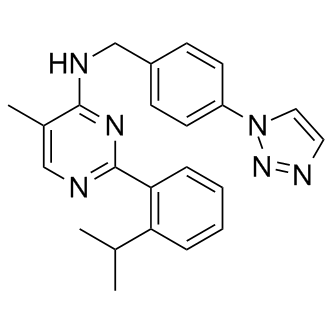| Cas No.: | 1572414-83-5 |
| Chemical Name: | ML323; ML 323 |
| Synonyms: | ML323; ML 323 |
| SMILES: | C(C1=CC=CC=C1C(C)C)1=NC=C(C)C(NCC2=CC=C(N3C=CN=N3)C=C2)=N1 |
| Formula: | C23H24N6 |
| M.Wt: | 384.48 |
| Sotrage: | 2 years -20°C Powder, 2 weeks 4°C in DMSO, 6 months -80°C in DMSO |
| Description: | ML-323 is a reversible, potent USP1-UAF1 inhibitor with IC50 of 76 nM in a Ub-Rho assay. The measured inhibition constants of ML-323 for the free enzyme (Ki) is 68 nM. |
| In Vitro: | ML-323 (ML323) is a highly potent inhibitor of the USP1-UAF1 deubiquitinase complex with excellent selectivity against human DUBs, deSUMOylase, deneddylase and unrelated proteases. ML-323 is a potent USP1-UAF1 inhibitor with IC50 values of 76 nM in a ubiquitin-rhodamine (Ub-Rho) assay and 174 nM and 820 nM in orthogonal gel-based assays using K63-linked diubiquitin (di-Ub) and monoubiquitinated PCNA (Ub-PCNA) as substrates, respectively. ML-323 probably exerts its inhibitory effect through an allosteric mechanism. The measured inhibition constants of ML-323 for the free enzyme (Ki) and the enzyme-substrate complex (K’i) are 68 nM and 183 nM. Besides, ML-323 potentiates Cisplatin cytotoxicity in non-small cell lung cancer and osteosarcoma cells[1]. ML-323 (ML323), a probe molecule that displays reversible, nanomolar inhibitory activity and excellent selectivity toward USP1/UAF1. In addition, ML-323 potentiates the cytotoxicity of Cisplatin and increases endogenous monoubiquitination levels of both PCNA and FANCD2, two known cellular targets of USP1/UAF1[2]. |

 To enhance service speed and avoid tariff delays, we've opened a US warehouse. All US orders ship directly from our US facility.
To enhance service speed and avoid tariff delays, we've opened a US warehouse. All US orders ship directly from our US facility.




















